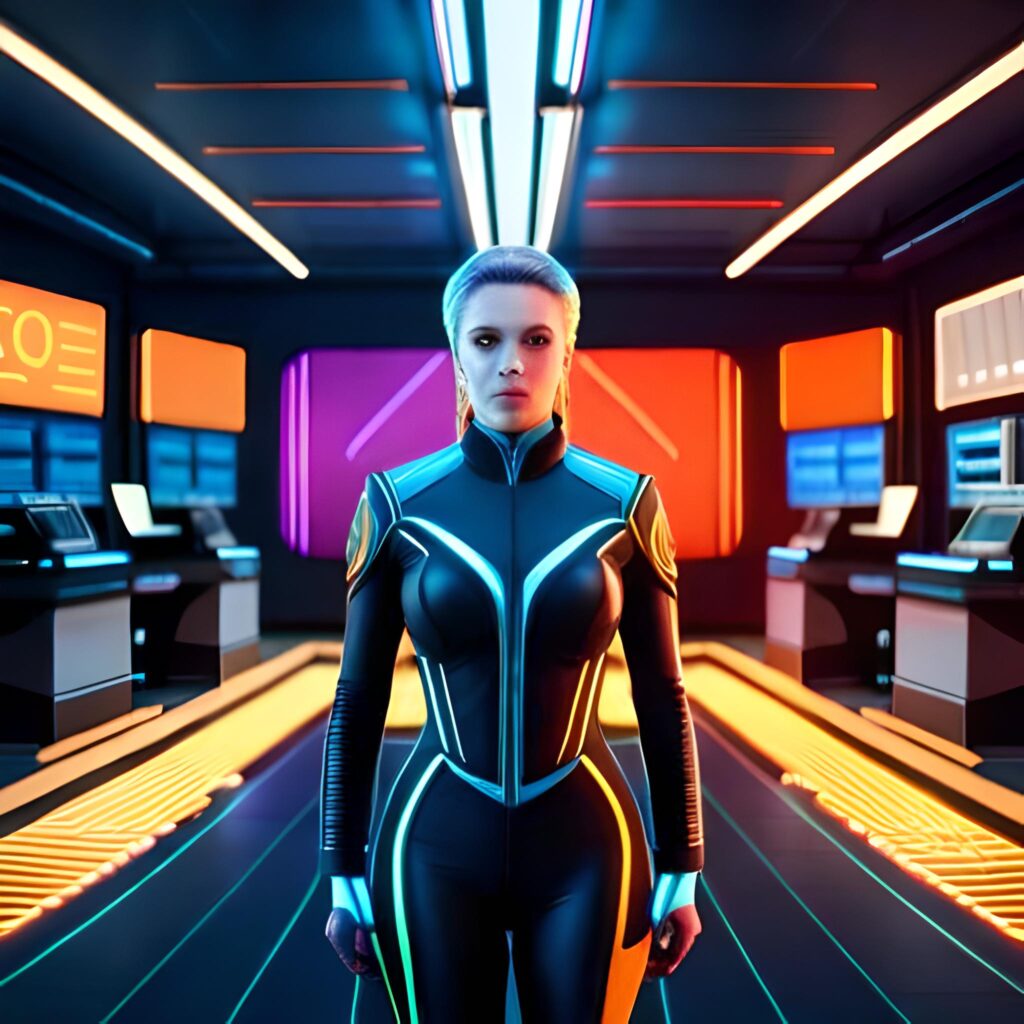
AI in Future: Unveiling the Path to Tomorrow
AI In Future Artificial Intelligence, commonly known as AI, is a revolutionary field of computer science that has been gaining momentum in recent years. This technology has the potential to reshape the world as we know it, making significant strides in various sectors. From healthcare to transportation and education to entertainment, AI is omnipresent and has already begun to shape our everyday lives. In this article, we will explore the evolution of AI, its impact on different industries, its presence in everyday life, its implications on the future of work, ethical considerations, challenges, sustainability, and the exciting possibilities that lie ahead.
Understanding Artificial Intelligence (AI)
Definition of AI In Future
AI, in its essence, is the creation of intelligent machines that can simulate human-like intelligence. These machines are designed to learn from experiences, adapt to new data, and perform tasks that typically require human intellect. The goal of AI is to enhance efficiency, solve complex problems, and ultimately make the world a better place.
Types of AI
Narrow AI, also known as Weak AI, is designed to perform specific tasks and excel at them. General AI, on the other hand, aims to replicate human-like intelligence and possess the ability to understand, learn, and perform any intellectual task that a human can.
Importance of AI
The significance of AI lies in its potential to augment human capabilities and improve overall efficiency and productivity across various domains. It holds the key to unlocking new possibilities and driving innovation to address some of humanity’s most pressing challenges.
The Evolution of AI
Early Developments
AI’s journey began with the ambitious dream of creating machines that could think and learn like humans. Early pioneers, such as Alan Turing, laid the groundwork for modern AI with the Turing test, a benchmark for determining a machine’s ability to exhibit human-like intelligence.
In the latter half of the 20th century, AI In Future research surged forward, and new techniques like machine learning emerged. Machine learning algorithms empowered computers to recognize patterns, process vast amounts of data, and improve their performance over time. This marked the birth of narrow AI, where machines excel in specific tasks but lack a broader understanding.
Modern Advancements
In recent decades, rapid technological advancements and the availability of vast amounts of data have accelerated AI research. Machine learning, a subset of AI, has witnessed remarkable progress, allowing computers to learn and improve from experience without explicit programming. The development of neural networks and deep learning algorithms has been a game-changer, powering breakthroughs in computer vision, natural language processing, and robotics.
Current State of AI Technology
Today, AI has permeated various industries and is being used for diverse applications, including image and speech recognition, virtual assistants, recommendation systems, and autonomous vehicles. The current state of AI technology showcases its potential but also highlights the challenges and ethical considerations that must be addressed as AI continues to advance.
AI’s Impact on Industries
Healthcare
The impact of AI on industries is already evident, and its influence is bound to intensify in the future. In healthcare, AI is assisting in diagnosing diseases, analyzing medical images, and discovering new drugs. The financial sector benefits from AI’s data-driven decision-making, fraud detection, and algorithmic trading.
In education, AI In Future is revolutionizing the learning experience by personalizing content and providing smart tutoring systems. The transportation industry is witnessing the advent of autonomous vehicles and smart logistics powered by AI. Even the entertainment sector is embracing AI to tailor content recommendations for users and create realistic virtual worlds.
Finance
In the financial sector, AI-powered algorithms help detect fraudulent activities, predict market trends, and optimize investment portfolios. AI’s speed and accuracy have revolutionized the trading landscape, making it more efficient and data-driven.
Education
AI In Future has the potential to revolutionize education by personalizing learning experiences, automating administrative tasks, and providing intelligent tutoring systems. Virtual classrooms and AI-driven educational platforms are paving the way for a more inclusive and adaptive learning environment.
Transportation
Autonomous vehicles and AI-driven logistics systems are reshaping the transportation industry. These innovations promise safer roads, reduced congestion, and more efficient freight management.
Entertainment
AI In Future is changing the way we consume entertainment content. Streaming platforms use recommendation algorithms to suggest personalized content, and AI is being employed in video game development to create more immersive and engaging experiences.
AI in Everyday Life
Virtual Assistants
These AI-powered helpers can answer questions, perform tasks, and control smart home devices.
Smart Homes
AI In Future plays a crucial role in enabling smart homes, where various devices and appliances can be interconnected and controlled remotely. From smart thermostats to voice-controlled lighting, AI enhances comfort and convenience.
Social Media Algorithms
The algorithms powering social media platforms use AI In Future to curate personalized content feeds for users. These algorithms analyze user behavior and preferences to deliver relevant and engaging content.
E-commerce Recommendations
Online retailers leverage AI In Future to recommend products to customers based on their browsing and purchase history.
AI and the Future of Work
Automation of Jobs
The rise of AI In Future and automation has raised concerns about job displacement. While some jobs may be automated, new job opportunities are also expected to emerge, requiring different skill sets.
New Job Opportunities
AI In Future has created job roles in fields like data science, machine learning engineering, and AI ethics. These roles play a pivotal role in developing, maintaining, and regulating AI systems.
Workforce Skills
As AI In Future becomes more prevalent, individuals need to acquire skills that complement AI technologies. Creativity, problem-solving, emotional intelligence, and adaptability will become increasingly valuable in the workforce.
Ethical Considerations in AI
Bias and Fairness
AI In Future algorithms can inherit biases from the data they are trained on, leading to biased outcomes. Addressing bias and ensuring fairness in AI systems is crucial to building an inclusive and just society.
Privacy Concerns
The use of AI In Future involves collecting and analyzing vast amounts of data, raising privacy concerns. Safeguarding personal data and implementing strong data protection measures are essential.
AI and Creativity
AI’s ability to generate content and art raises questions about authorship and creativity. Exploring the relationship between human creativity and AI-generated content is a fascinating ethical consideration.
Challenges and Limitations of AI
Data Security
The reliance on data makes AI In Future vulnerable to cyber threats and attacks.
General AI vs. Narrow AI
Developing General AI, which possesses human-like intelligence, remains a significant challenge. Most current AI systems are narrow in their capabilities and lack true understanding.
AI and Human Emotions
Understanding and interpreting human emotions are complex tasks for AI. While AI can recognize emotions through facial expressions, empathy and emotional intelligence are still beyond its scope.
AI and the Workforce
AI’s growing presence raises concerns about its impact on the workforce. While AI may automate certain tasks, it also opens up new job opportunities in fields like data science, AI research, and human-machine collaboration. Upskilling and reskilling the workforce will be vital to navigate this transition successfully.
AI and Sustainability
Energy Efficiency
AI In Future has the potential to optimize energy consumption and reduce the carbon footprint by managing resources more efficiently.
Environmental Applications
AI is instrumental in monitoring and protecting the environment. From wildlife conservation to climate modeling, AI aids in environmental preservation.
AI for Sustainable Development
By analyzing vast datasets, AI can identify trends and patterns that help facilitate sustainable development and address social and environmental challenges.
The Future of AI
Advancements in AI Research
Researchers continue to push the boundaries of AI, exploring new algorithms, architectures, and applications. The integration of AI with other emerging technologies will pave the way for groundbreaking innovations.
Possibilities and Speculations
As we peer into the future, the potential of AI is both exciting and awe-inspiring. Some experts speculate that AGI could surpass human intelligence, leading to transformative advancements in science, medicine, and technology. Yet, concerns about the control and ethical implications of superintelligent AI remain.
Ultimately, the future of AI is shaped by the collective choices we make today. Responsible development, ethical frameworks, and global collaboration will pave the way for an AI-powered future that benefits all of humanity.
Conclusion
In conclusion, AI’s rapid evolution has had a profound impact on various industries and is transforming the way we live and work. As AI continues to advance, it is essential to address ethical considerations and ensure responsible development. Embracing AI’s potential while being mindful of its limitations will lead to a future where AI and humans coexist synergistically, driving innovation and progress.
FAQs
- Q: Will AI replace human jobs entirely? A: While AI may automate some tasks, new job opportunities will arise, emphasizing the importance of upskilling and adaptability.
- Q: Can AI be creative? A: AI can generate content and art, but true creativity and emotional depth remain uniquely human traits.
- Q: Is AI biased? A: AI algorithms can inherit biases from their training data, making bias mitigation crucial for fair and inclusive AI systems.
- Q: How does AI impact sustainability? A: AI can enhance energy efficiency, monitor environmental conditions, and contribute to sustainable development efforts.
- Q: What does the future of AI hold? A: The future of AI is filled with possibilities, including AGI development and new advancements in robotics, which will shape the world in exciting ways.
